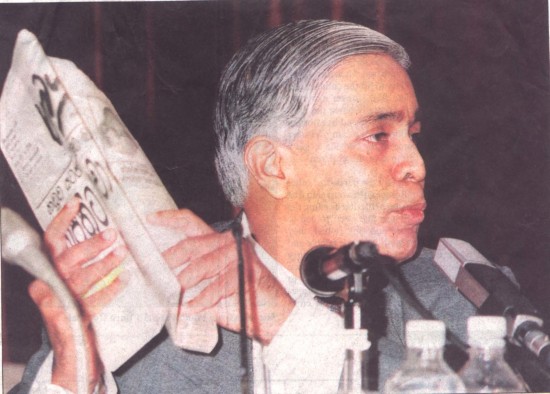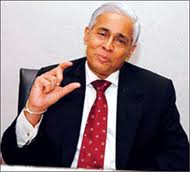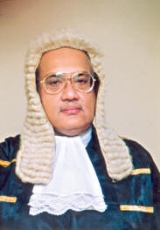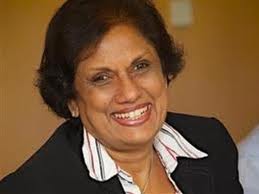Beware wolves in sheep’s clothing: The diabolical/enigmatic Sarath N. Silva
Never never land
Sarath N. Silva was never guilty of attempting to conceal his arrogant conviction that no
individual or body of persons could possibly have any right to call in question or inquire into his conduct, both personal and official.
No remorse
In a clear attempt to prevent any inquiry into his alleged misdeeds, for which he has never shown any remorse, in June 2001 Sarath N. Silva’s Supreme Court made order restraining the Speaker from even entertaining the impeachment motion against him.
Anura speaks up as speaker
Then Speaker, Anura Bandaranayke, held that the Supreme Court had no jurisdiction to issue
interim orders restraining the Speaker of Parliament in respect of the steps he was empowered to take under Standing Order 78A. Not to be outdone, Sarath N. Silva exploited the goodwill of President Kumaratunga, (to whom he had already administered the Oath of office for her second term as President, initially in public, in 1999 and once again secretly in 2000, in accordance with his unique interpretation of the Constitution), and prevailed on her to immediately prorogue and thereafter dissolve Parliament.
A second attempt at impeachment was effectively thwarted, and
he continued his personal and official misdeeds with redoubled vigour, in a most cavalier fashion. In public, he even denounced lawyers who charged exorbitant fees from their clients, stating that they would “roast in hell”.
Abuses Shirani in vile language
On 30th December 2004, at a meeting of the Judicial Service Commission, Sarath N. Silva abused Shirani Bandaranayake J in vile language in the presence of Weerasooriya J, and others and continued to unilaterally conduct the affairs of the Judicial Service Commission in 2005, compelling them to resign from the Judicial Service Commission in January 2006, citing matters of conscience.
Karapincha treatment
Having administered the “Karapincha” treatment to Minister S.B.Dissanayake and President Kumaratunga, Sarath N. Silva shifted his allegiance to Leader of the Opposition Mahinda Rajapaksa, cleared him from allegations of misappropriating Tsunami funds, and now proudly proclaims that he “was responsible to bring Rajapaksa into power.” His lust for power was such that he shamelessly exercised Executive power to the extent of even granting permits for harvesting of sand, until he barked up the wrong tree by determining the price at which petrol should be sold, fell foul of the President and virtually waged war on him. The chimes of time eventually rang out the news that his “reign of terror” was over and, he would have slipped unsung into oblivion, if not for his newly found religious fervour.
Full circle
His overt support of General Sarath Fonseka gave him some respite and he made strong statements highly critical of the Rajapaksa regime. Having turned full circle, he is now back in the Rajapaksa camp, attempting to lend credence to the attempts to impeach the Chief Justice, whose appointment to the Supreme Court, he claims, was due to his defending the challenges to her appointment.
Back in the Rajapakse camp
He has stated, inter alia, that, she should not have declined to accept the President’s invitation to meet him, she should quietly resign and go away to save the Judiciary, and, the President has the power to appoint an Acting Chief Justice in view of the impeachment proceedings.
Deliberately misintepreting the Constitution
Having exercised the power of the Judicial Service Commission to appoint a Chairman of the  Administrative Appeals Tribunal in terms of Art. 59(1) of the Constitution for a period of 3 years in terms of Act. No. 4 of 2002, enacted in terms of Art. 59(3) of the Constitution, he unlawfully appointed another Chairman under the same provisions when the incumbent Chairman had served only for two years.
Administrative Appeals Tribunal in terms of Art. 59(1) of the Constitution for a period of 3 years in terms of Act. No. 4 of 2002, enacted in terms of Art. 59(3) of the Constitution, he unlawfully appointed another Chairman under the same provisions when the incumbent Chairman had served only for two years.
He seems to believe that Article 109(1) which provides that “if the Chief Justice is temporarily unable to exercise, perform and discharge the powers, duties and functions of his office, by reason of illness, absence from Sri Lanka or any other cause, the President shall appoint another Judge of the Supreme Court to act in the office of Chief Justice”, could be interpreted to mean that, notwithstanding the fact that the Chief Justice is neither ill nor absent from Sri Lanka, the words “or any other cause” could be interpreted to mean that initiation of a process of impeachment empowers the President to make such an acting appointment. He certainly knows that the “Rules of Interpretation of Statutes” does not permit any such interpretation.
Is he entitled to continue having his name in the Roll of Attorneys-at-Law?
Elmore Perera, Attorney-at-Law,
Founder, Citizen’s Movement for Good Governance,
Past President, Organisation of Professional Associations.



